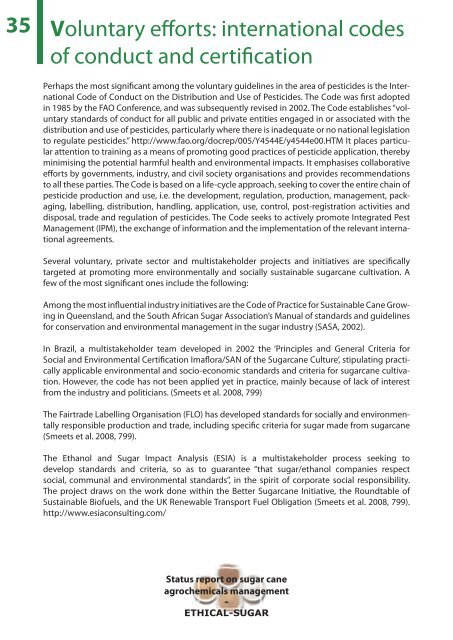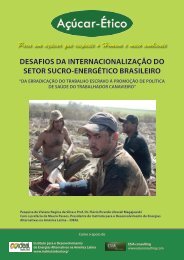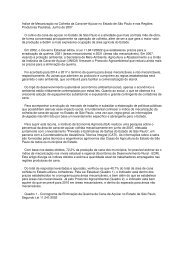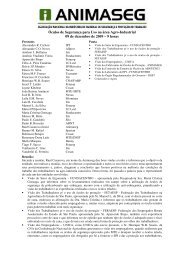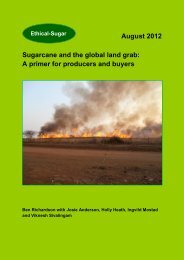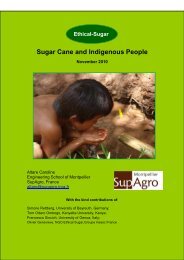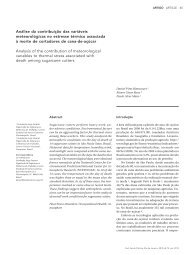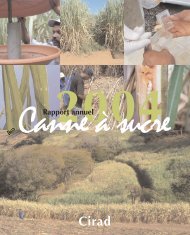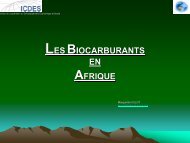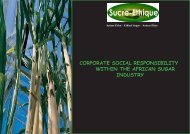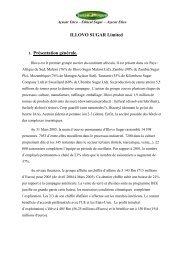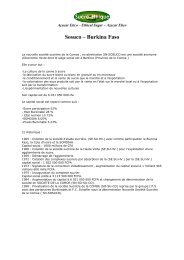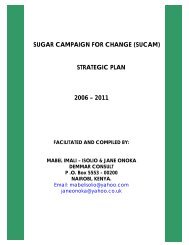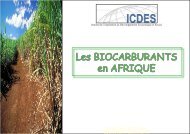Status report on sugar cane agrochemicals ... - Sucre Ethique
Status report on sugar cane agrochemicals ... - Sucre Ethique
Status report on sugar cane agrochemicals ... - Sucre Ethique
Create successful ePaper yourself
Turn your PDF publications into a flip-book with our unique Google optimized e-Paper software.
35<br />
Voluntary e� orts: internati<strong>on</strong>al codes<br />
of c<strong>on</strong>duct and certi� cati<strong>on</strong><br />
Perhaps the most signi� cant am<strong>on</strong>g the voluntary guidelines in the area of pesticides is the Internati<strong>on</strong>al<br />
Code of C<strong>on</strong>duct <strong>on</strong> the Distributi<strong>on</strong> and Use of Pesticides. The Code was � rst adopted<br />
in 1985 by the FAO C<strong>on</strong>ference, and was subsequently revised in 2002. The Code establishes “voluntary<br />
standards of c<strong>on</strong>duct for all public and private entities engaged in or associated with the<br />
distributi<strong>on</strong> and use of pesticides, particularly where there is inadequate or no nati<strong>on</strong>al legislati<strong>on</strong><br />
to regulate pesticides.” http://www.fao.org/docrep/005/Y4544E/y4544e00.HTM It places particular<br />
attenti<strong>on</strong> to training as a means of promoting good practices of pesticide applicati<strong>on</strong>, thereby<br />
minimising the potential harmful health and envir<strong>on</strong>mental impacts. It emphasises collaborative<br />
e� orts by governments, industry, and civil society organisati<strong>on</strong>s and provides recommendati<strong>on</strong>s<br />
to all these parties. The Code is based <strong>on</strong> a life-cycle approach, seeking to cover the entire chain of<br />
pesticide producti<strong>on</strong> and use, i.e. the development, regulati<strong>on</strong>, producti<strong>on</strong>, management, packaging,<br />
labelling, distributi<strong>on</strong>, handling, applicati<strong>on</strong>, use, c<strong>on</strong>trol, post-registrati<strong>on</strong> activities and<br />
disposal, trade and regulati<strong>on</strong> of pesticides. The Code seeks to actively promote Integrated Pest<br />
Management (IPM), the exchange of informati<strong>on</strong> and the implementati<strong>on</strong> of the relevant internati<strong>on</strong>al<br />
agreements.<br />
Several voluntary, private sector and multistakeholder projects and initiatives are speci� cally<br />
targeted at promoting more envir<strong>on</strong>mentally and socially sustainable <strong>sugar</strong><strong>cane</strong> cultivati<strong>on</strong>. A<br />
few of the most signi� cant <strong>on</strong>es include the following:<br />
Am<strong>on</strong>g the most in� uential industry initiatives are the Code of Practice for Sustainable Cane Growing<br />
in Queensland, and the South African Sugar Associati<strong>on</strong>’s Manual of standards and guidelines<br />
for c<strong>on</strong>servati<strong>on</strong> and envir<strong>on</strong>mental management in the <strong>sugar</strong> industry (SASA, 2002).<br />
In Brazil, a multistakeholder team developed in 2002 the ‘Principles and General Criteria for<br />
Social and Envir<strong>on</strong>mental Certi� cati<strong>on</strong> Ima� ora/SAN of the Sugar<strong>cane</strong> Culture’, stipulating practically<br />
applicable envir<strong>on</strong>mental and socio-ec<strong>on</strong>omic standards and criteria for <strong>sugar</strong><strong>cane</strong> cultivati<strong>on</strong>.<br />
However, the code has not been applied yet in practice, mainly because of lack of interest<br />
from the industry and politicians. (Smeets et al. 2008, 799)<br />
The Fairtrade Labelling Organisati<strong>on</strong> (FLO) has developed standards for socially and envir<strong>on</strong>mentally<br />
resp<strong>on</strong>sible producti<strong>on</strong> and trade, including speci� c criteria for <strong>sugar</strong> made from <strong>sugar</strong><strong>cane</strong><br />
(Smeets et al. 2008, 799).<br />
The Ethanol and Sugar Impact Analysis (ESIA) is a multistakeholder process seeking to<br />
develop standards and criteria, so as to guarantee “that <strong>sugar</strong>/ethanol companies respect<br />
social, communal and envir<strong>on</strong>mental standards”, in the spirit of corporate social resp<strong>on</strong>sibility.<br />
The project draws <strong>on</strong> the work d<strong>on</strong>e within the Better Sugar<strong>cane</strong> Initiative, the Roundtable of<br />
Sustainable Biofuels, and the UK Renewable Transport Fuel Obligati<strong>on</strong> (Smeets et al. 2008, 799).<br />
http://www.esiac<strong>on</strong>sulting.com/<br />
<str<strong>on</strong>g>Status</str<strong>on</strong>g> <str<strong>on</strong>g>report</str<strong>on</strong>g> <strong>on</strong> <strong>sugar</strong> <strong>cane</strong><br />
<strong>agrochemicals</strong> management<br />
-<br />
ETHICAL-SUGAR


